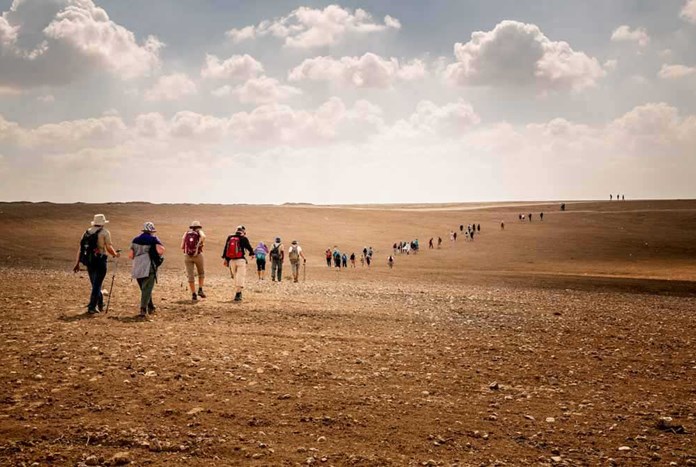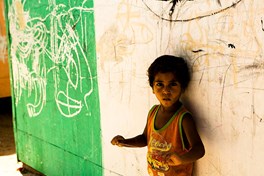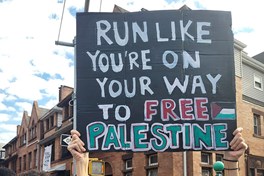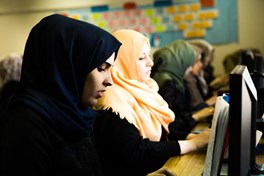Just Walk arrives in Jerusalem
On our first night in Jericho, I asked the nine who had walked the whole way and the four who had walked over halfway, to recount some of their favourite moments of the walk to the 60-plus people who had joined us to complete the 3,400-kilometre epic journey from London to Jerusalem.
The most common themes were hospitality and conquering the Alps. Tim and Cressey both talked about the incredible hospitality of strangers and the welcome received by them. Cressey recounted how this was even extended to one of the dogs that had followed her (dogs following the walkers for innumerable miles was all too common), and how the people she met even reunited it with its owners.
For Jude and Naomi, completing the climb to the St Bernard Pass (between Switzerland and Italy), was the highlight, both for the welcome they received and for giving them the belief that they really could complete this. For Jack, it was the walk down the Aosta valley the next day and the need to walk 9km in 90 minutes to catch the last cable car of the day. Ten minutes before it closed, three of us were there – two minutes later the remaining sixteen arrived from disparate directions.
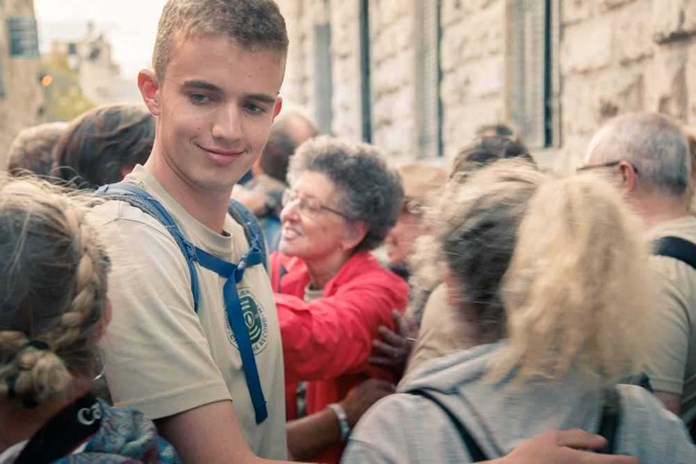
Jack's arrival
The youngest 'All-Way Walker', Jack Rose aged 18 as he entered Jerusalem's Old City on Thursday 2nd November at the end of Just Walk to Jerusalem. © Amos Trust/Mark Kensett
Lynn cited an earlier evening just outside St. Quentin (for me, it will forever be synonymous with the Johnny Cash song), where half the group opportunistically commandeered the support vehicle and those who were meant to be in it, watched as thirty minutes later, the door was taken off by another driver.
Lynn was in the first group who were promptly banned by an irate hotel manager from hanging their washing outside their rooms. For Arthur, it was a mythical early morning ferry ride across the river Po, with a ferryman who appeared through the mist on a skiff. Justin recounted the journey from Ancona to Durres and sitting up on deck in the early hours watching an electrical storm surround the boat (a boat which seemed to be permanently stuck in first gear).
For Robin, it was our ability to defeat the few guides whom we used. We only occasionally used guides as Robin and Tim did such a great job finding routes but we had a high attrition rate. They either fell by the wayside or didn’t actually know where we were going. A highlight was in Albania as our second guide, the mountain walker, exclaimed "I have to stop! My knees they are going to explode.”
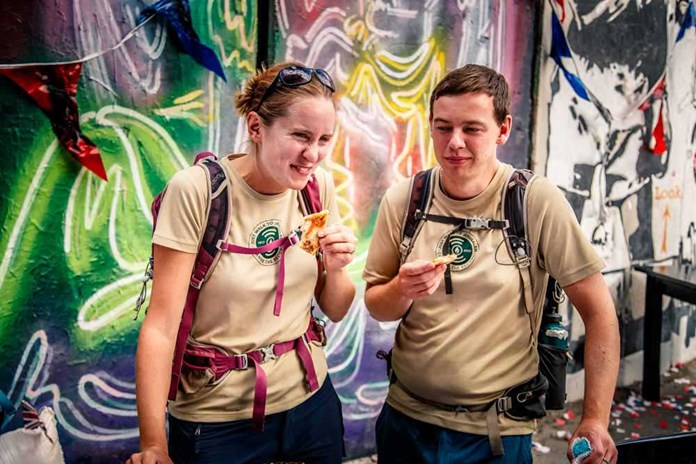
Pizza — courtesy of Banksy
Naomi and partner Robin, two 'All-Way Walkers', enjoying pizza at the Walled Off Hotel courtesy of Banksy. Earlier in the day, a new piece of art had been unveiled to mark the Balfour Centenary. © Amos Trust/Mark Kensett
David told of one of my most favourite encounters, walking into what seemed like an abandoned village in Macedonia having gone off-piste on a fantastic morning walk. We decided to visit the beautiful Macedonian Orthodox church and found most of the village there. They welcomed us in, as they were about to start a vigil to mark thirty days after one of their community had died.
They called over Father Goran, who delayed the service and explained what they were doing, the icons around us and about the Macedonian Orthodox church. When asked for a blessing he turned to us and said, “Who am I to bless you? I am just a person. Your walk is your blessing."
Once we left the church we met the rest of the village in the run-down village shop/café/bar, where one of the clientele insisted on buying us a drink and welcomed us in.
Jenny recounted how on one of the last days before reaching Istanbul, Jack led the daily thought and asked them to be still and remember where they had walked before playing Louis Armstrong’s “What a Wonderful World”, before leading the days' liturgy.
The liturgy played a key role each day and those days when we delayed it, so as to ensure everyone could join in, we felt strangely bereft and aimless until it was said. It reminded us why we were walking and reminded us that "Another world is not only possible she is on her way – on a quiet day (and there were a few amidst our 147 days), we could hear her breathing".
Denise’s highlight were her companions, the core component and the ever-changing roster of walkers and how much it had meant to her. Over 100 people walked over 100km for Just Walk and our total distance walked exceeded 50,000km.
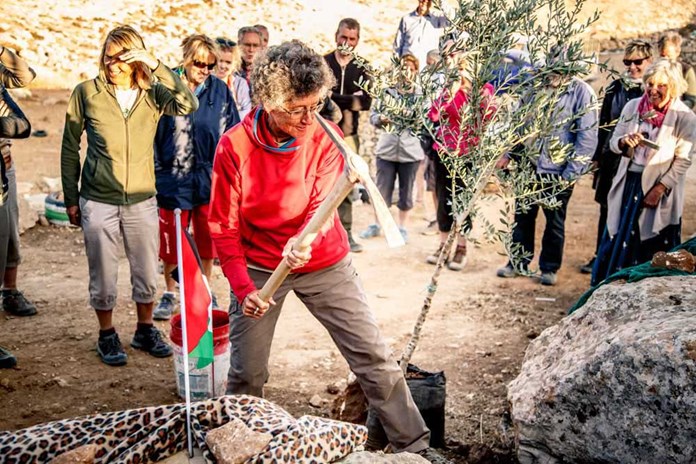
"Put your back into it"
'All-Way' Walker Denise helping to plant an olive tree in Amos' honour at the Sumud Peace Camp in the South Hebron Hills. © Amos Trust/Mark Kensett
There are countless other highlights and if given a chance, people may have recounted entering through the cloister enclosed walkway into Bologna or at the Hagia Sophia. Or maybe arriving at the camp site in Switzerland, (bad, bad, good), or the two days when we walked through the vineyards on the north-side of Lake Geneva with Swiss EAPPI’s and the next day, heading off into the foothills of the high Alps for a remarkable day in which Tony our driver arranged lunch for us in a beautiful courtyard of a winery (which the owners joined us for), or when we concluded that weeks walk by finding a curry house specialising in vegetarian cuisine on our elected route.
We have to give a shout out to the fantastic team of drivers, each of whom initially seemed slightly daunted by the challenge but then magnificently rose to it in their own unique ways. Without them, the Walk would not have been possible. There are so many highlights, Greece most people’s favourite country to walk has not even had a mention and a book could be written about it – in fact, I think one of our number is doing just that now.
But then we come to the last week of the Walk. Thirty of us arrived in the West Bank through Jordan. Our second-generation Palestinian refugee guide showed us Jabal el-Hussein camp, one of ten UNWRA camps dating from the 1948 Nakba and the 1967 Occupation. Well over half of Jordan’s population are Palestinian refugees, most of whom are denied the right to return to the Palestinian territories or Israel, despite being able to overlook the country they came from.
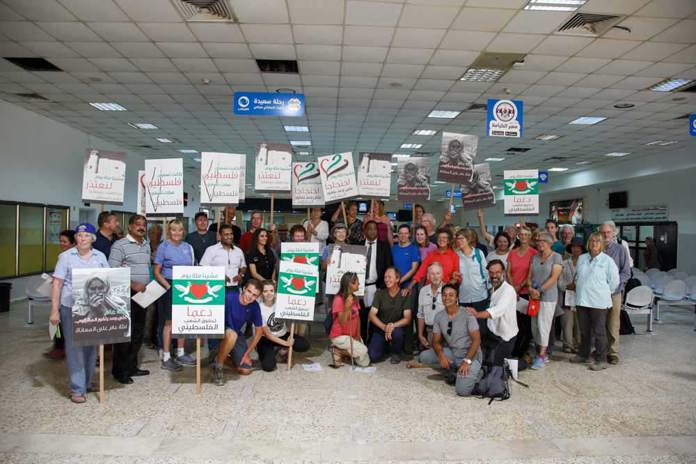
Safe arrivals
The group just after they arrived in Jericho, inside the West Bank from Amman in Jordan. They were greeted by 30 other people who had flown into Tel Aviv to complete the Walk. © Amos Trust/Mark Kensett
We journeyed down to Petra (or as Indiana Jones fans know it, the Valley of the Crescent Moon), and hiked round to Little Petra – a fantastic day, ending in beautiful Bedouin accommodation. The next day was an equally beautiful hike before concluding by sleeping out under the stars at a campsite made for us but with no amenities.
Then a final morning’s walk by the Dead Sea and time to relax at the hotel before the journey over the Allenby Bridge into Palestine. The crossing of the Allenby Bridge was always our greatest concern – 95% of the time it would be fine, but was this going to be different? Would our walk end here?
There were three false hips in our party (their owners had to be fully searched), a second-generation Palestinian refugee travelling on UK passport (birthplace Beirut) and an ex EAPPI who had been stopped in Hebron, meant it was never going to be plain sailing. Apparently, they concluded that the very annoying priest leading them was such a complete pain, that they wanted to get us through quickly, and 30 minutes later we found ourselves in Palestine – 90 minutes too early for our welcoming committee.
I personally think that either Israeli border controls have entered into a new charm offensive or else a large number of people were saying a quiet word for us – take your pick.
Then the welcome. We were greeted by the 30 other people who had flown into Tel Aviv to complete the Walk with us and the Mayor of Jericho. We tried to say the liturgy together in English and Arabic (no one reads Arabic), before we walked with school children and town officials carrying placards apologising for Balfour, with passing cars honking as we walked into the centre of town.
The next day we would walk back to Jericho but this time coming down the Masari Ibrahim trail with Hosam our guide, who was fantastic but who decided that walking was of the devil as he blistered up, and sped up to get it over with.
We walked to the centre of the town for a press conference and an official welcome. Our apology for the impact of Balfour on Palestinians, our rejection of Theresa May’s decision that the British government would be celebrating Balfour and the acknowledgement that we had no right to promise this land to another was broadcast live on Palestine TV and set in motion a press onslaught that would follow us through the rest of the walk.
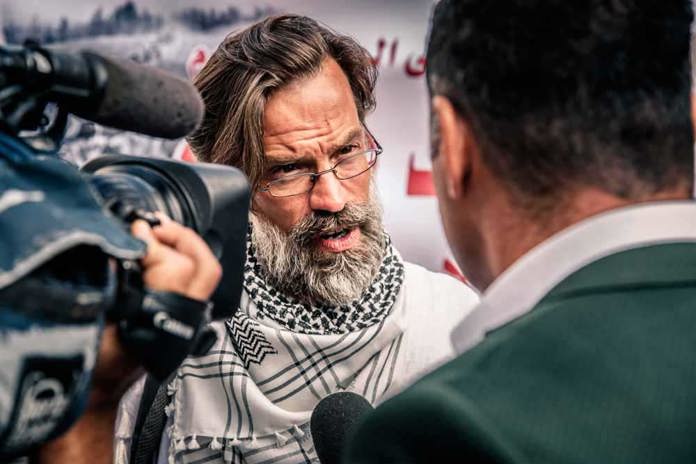
Media onslaught
Just Walk originator Justin Butcher being interviewed, again — this time on the final day of the Walk in Ramallah. The press and media interest in what we were doing grew and grew as the final stage of Just Walk came to its conclusion. © Amos Trust/Mark Kensett
I am often asked about UK press coverage. Our Change The Record campaign was featured on Radio 4 and there have been various snippets elsewhere, but we never really expected much more than this. The UK press gave a fairly high-level of coverage to the Balfour centenary but the Walk was not something they would cover. Our launch event was a week after a terror attack on the South Bank and two days after a snap General Election, and as one seasoned observer noted it was all a bit too hopeful. However, our greatest hope was for press coverage in Palestine and the Middle East.
Our act was an act of contrition and penance for one hundred years of suffering. Ours was an apology to those who state that their suffering started on 2nd November 1917, with a proclamation by the British Foreign Secretary. As with any sufferer of abuse, it is the victim who needs to be the focus of attention, not the perpetrator or the beneficiary. So when Palestine TV started to follow our walk, with regular updates and extended specials, numerous other Middle Eastern, Israeli and Arabic-speaking and Palestinian channels picked it up. It was fantastic.
After Jericho, we travelled south to Tuqu (the birthplace of the prophet Amos), where we joined 100 young adults from Right To Movement, who had founded the Palestine Marathon. We had a beautiful day walking down a very dry wadi with lots of laughter, dancing and a traditional Bedouin lunch. The next day was very different but equally special as we joined up with our partners from Alrowwad and walked from Aida camp to al Azra camp, onto Dheisha camp for lunch and then finally, down to the south of Bethlehem to Arroub camp for dinner.
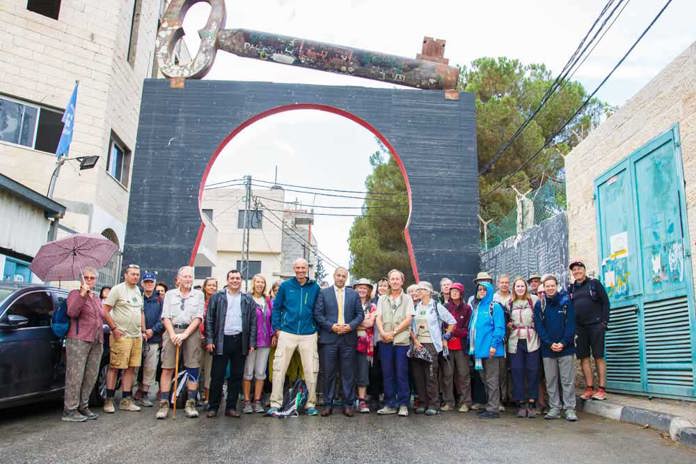
Right To Return
The Walkers with Dr Abdelfattah, beneath the huge 'Aida Key', an important symbol of Palestinian right to return. We were joined by our partners from Alrowwad as we walked from Aida camp to al Azra camp, onto Dheisha camp and then finally down to the south of Bethlehem to Arroub camp. © Amos Trust/Mark Kensett
Merai from Arroub had organised a bus-load of young people to walk with us and together we finished the day eating his Zaab chicken in a hall decked out for a wedding banquet.
Sunday started where we had finished, with our friends in Arroub. We visited a local school where we had painted murals in 2016 and obviously had to play a quick game of football with them, before heading off to meet the family whose home we had helped rebuild in 2015.
It was amazing to see how it has transformed their lives – so much so that they are now adding a second floor so their son can get married and live there. It was deeply moving, especially for those in our group who had not been back since the home rebuild trip some three years previously.
We then headed south to Hebron with each community we passed, wanting to honour us. One abiding memory from our group is of people coming up to them and asking "Where’s Mr Chris?", as in each location, I was asked to join an all-male platform and speak on behalf of the walkers. In each, I thanked them for the welcome, outlined our journey and explained why we had walked, apologised for Balfour and said how we would continue to stand in solidarity with them until Palestine was free.
As they thanked us and were so appreciative of our apology and solidarity, I could not but help feel a fraud. Yes, we had walked a long way and goodness knows our apology was heartfelt but I have never been wronged in the way that they have and cannot imagine how a century of dispossession feels.
A welcoming party of city officials, the Governor, local NGO leaders and members of Youth Against Settlements greeted us on the outskirts of Hebron. We were then taken to the edge of Kiryat Alba settlement, where the road runs between the settlement and the Palestinian communities. We had given the walk over to local groups whose work we are excited by and support – for them, it was important that we walked down this street, where there will often be clashes, as a demonstration of international support.
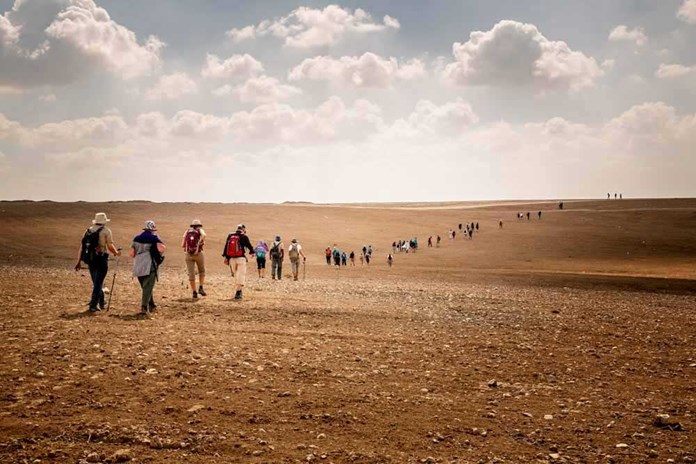
Walking the Negev
Over sixty people on the final stage of Just Walk snaking their way across the Negev Desert in Israel. © Amos Trust/Mark Kensett
The level of aggression directed at us by one particular settler, and verbally from others, as well as the large police and army presence called in to surround and move us on, was unnerving, especially as we had not planned on being in this part of town. However, it was a powerful demonstration of how Israeli settlers come under Israeli law and Palestinians under military law, as a member of the Governor’s office was arrested for defending himself from the settler’s physical assault while nothing happened to the settler.
Holy Land Trust had been the most fantastic hosts and partner for this part of the Walk. The sheer amount of work from their team to organise this last week and respond to press requests was amazing. The next day they took us to the South Hebron Hills to meet the Bedouin communities they work with and introduced us to the Sumud Peace Camp.
Sumud means 'steadfastness' and in many ways, this was my favourite day on the West Bank, as we met a series of people who are committed to remaining and to building a future when it would be far easier to pack up and leave (other than they have no other place to go to).
We started at a girls school established by Hebron International Relief Network at Az-Zuweidin – a small windswept school funded by donations from international supporters including a couple of our walkers which clings to the edge of Area B. Building work on a larger school had had to stop because it was in Area C and they had been refused permission by the Israeli authorities. But in Area B, the Israelis do not have such direct control. The pride and enthusiasm and huge level of preparation that had gone into their presentation for us was beautiful, as was hearing their disbelief when Naomi explained how far we had walked and why.
We then headed to the village Um al–Khair, a Bedouin community on land purchased in the 1930’s, which is now on the edge of an ever-expanding illegal Israeli settlement. They have had their grazing land taken; they have had demolition orders served and demolitions carried out on all their homes and structures and have no running water or electricity.
The young activists we met there were inspiring, and eating with them in their make-shift library and schoolroom was great. Many of the community are fearful of their children going to school outside of the village as they have been threatened by aggressive settlers.
With these home demolition orders and the expansion of the settlement, my community – my nieces and nephews, aunts and uncles – are facing expulsion. Despite this, we believe in change. In our community, we believe that we can work together for peace and justice.”
Tariq Hathaleen, Um al-Khair
From here we walked to the Sumud Peace Camp, which Holy Land Trust established with the local area committee and a coalition of Palestinian and Israeli peace organisations to create a permanent presence in these villages. They have converted several large caves into living spaces and are working with the communities to ensure access to grazing land (on land that they have been too scared to use), and to schooling and are seeking to convert more caves into living space and to provide practical support for those whose homes have been demolished.

Sumud — 'steadfastness'
The Just Walk final stage group at the Sumud Peace Camp in the South Hebron Hills where we met a series of people who are committed to remaining and to building a future in villages that have been demolished over one hundred times. Sumud means, 'steadfastness'. © Amos Trust/Mark Kensett
Each time the Israeli authorities raid the camp, they confiscate whatever they can – from bedding to mattresses to barbeque equipment, yet they are determined to stay and use it to train activists in non-violent resistance. The Sumud Camps' response to the walk was possibly the most moving response that we received, as they so clearly understood the costly nature of solidarity.
I was deeply moved when they asked us to plant their first olive tree with them on an area they had prepared for us and then unveiled 'Amos Trust' painted on the surrounding rocks. We finished the day in the dark of Susya an archaeological site and home to a Palestinian community and far newer Israeli settlement.
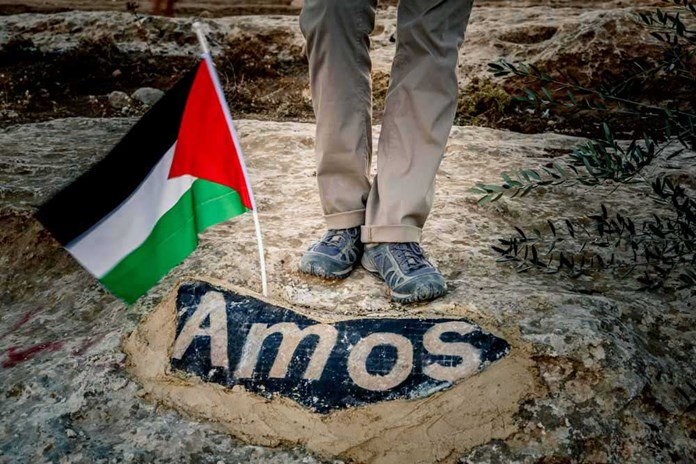
Standing in solidarity — literally
The word 'Amos' painted onto a rock next to a Palestinian flag at the Sumud Peace Camp in the South Hebron Hills where we were honoured with an olive tree, their first, that we helped plant. © Amos Trust/Mark Kensett
The community is waiting to hear their fate as the Israeli government have once again refused their area plan and have warned them that they will destroy their homes and forcibly move them on. The only thing preventing this appears to be international pressure.
From here we headed south to the Negev to symbolically walk between the Bedouin communities inside Israel. Some of these communities have been destroyed more than one hundred times. We walked between villages with a community activist/guide from AJEEC’s Negev Institute, before meeting local residents over lunch.
Then to the Gaza border. Our host, an Israeli artist, talked of the fear for her children and explained how the Wall (at the end of her street), and the 2014 attack on Gaza, were necessary to stop rocket attacks. Her indifference to the consequences in Gaza and lack of awareness was deeply unnerving.
However, standing by the Wall, looking out over Gaza as Nive read Khaled Juma’s ‘Rascal Children of Gaza’, was highly profound, "Rascal Children, Come Back, Just Come Back."
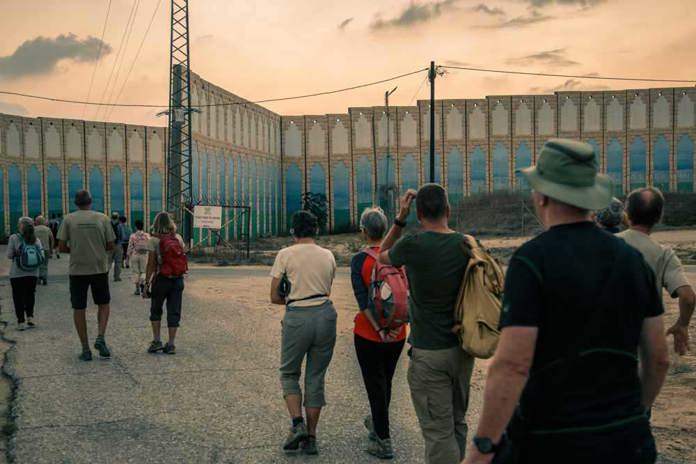
The Gaza/Israel border
We read Khaled Juma's poem 'Rascal Children of Gaza' while standing at the Israeli/Gaza border as we looked out across Gaza City. © Amos Trust/Mark Kensett
On the 1st November (or Balfour Eve as it had become known), we were in Bethlehem to visit our friends at Wi’am Conflict Resolution Centre and for artist Banksy’s street party at the Walled Off Hotel and the unveiling of an apology carved in the Separation Wall. From here we joined with members of Alrowwad for their protest against Balfour.
Then that night, Holy Land Trust organised a candlelit vigil in Manger Square. The Imam and Orthodox Bishop led prayers for peace and Sami from Holy Land Trust and I spoke at this very simple, very poignant event.
So as the centenary dawned, eleven of us, the 'all-way' walkers from the UK and trustee Robert Cohen, travelled to Jerusalem, to the British Consular General to present a new Balfour Declaration and an open letter to Theresa May that Just Walk originator Justin Butcher had written.
In a friendly discussion, he accepted most of our points but speaking on behalf of the Government, could not accept the call to recognise Palestinian statehood or the need for an apology for the Balfour Declaration.
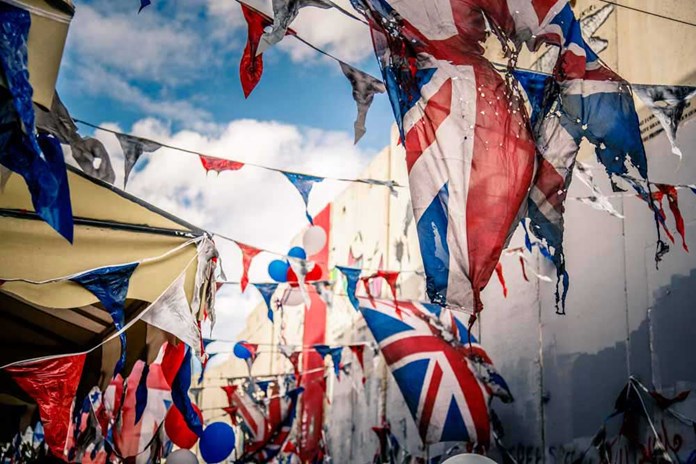
Banksy's British Balfour Tea Party
The Walled Off Hotel in Bethlehem held a 'very British' tea party for local Palestinian refugee children just outside the hotel where they were treated to tea and cake. And pizza. © Amos Trust/Mark Kensett
From here it was to Ramallah where we were special guests at a conference for Palestinian ministers and international bodies to mark Balfour centenary. I was proud to introduce myself as 'Abu Jack', to the delight of the audience, before quoting Martin Luther King that "No one is free until everyone is free" and Mandela’s caveat, "No one is free until Palestinians are free."
We then went on to fulfil an invitation to appear at the main protest in the centre of Ramallah and then walked over to the Presidential complex for a private lunch with President Mahmoud Abbas who had been so struck by our walk and our act of solidarity that he wanted to meet with us. Sami and I spoke with him about Gaza and some of the more incongruous elements of the Walk.
Our final walk was down the Mount of Olive’s to the Lion’ Gate. We read the liturgy together and Jesus' words, (as he wept over the city), “Jerusalem, if only you knew what would bring you peace”. Then we headed down the hillside and came up to enter Jerusalem, where all those who had joined the walk and friends who were finishing the walk with us, lined up on either side of the gate and cheered the walkers into the City. The Just Walk to Jerusalem had finished.
It was a fitting, very moving and slightly ramshackle end. Another finale had been planned but 24-hours earlier, it had to be pulled after it was feared that it would lead to an international incident – such is life.
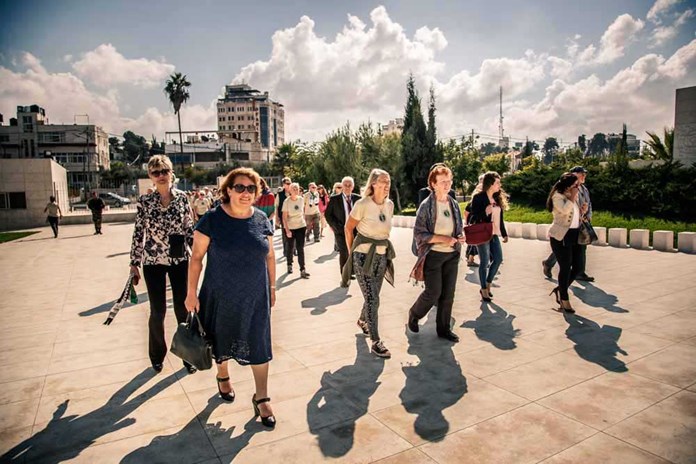
A Presidential visit
The Just Walkers had been invited to meet President Mahmoud Abbas who had been so struck by our walk and our act of solidarity that he wanted to meet with us in Ramallah on the final day of the Walk. © Amos Trust/Mark Kensett
From here we walked across the city to St George’s Cathedral for a service of penance and to mark the end of the Walk. This was led by Amos Founder and Canon of St George's, Gath Hewitt, with contributions from Zoughbi Zoughbi from Wi’am and Naim Ateek from Sabeel. It was great to see a full cathedral for what was a very much-needed act of penance.
Afterwards, the all-way walkers gathered together for a final time together before going to our last supper in Beit Sahour where we joined by many friends in the wonderful Tent Restaurant. But it did not end there, throughout the week in Palestine, we had been asked what protests were happening in the UK and explained that we were going to fly back and join the rally that the Palestine Solidarity Campaign were organising in central London.
Over one hundred Amos supporters joined 15,000 protestors. We told them what we had done before reading the words of the liturgy for a final time to the assembled crowd after which Justin and I joined the front of the walk to Parliament Square.
We walk this day with those whose freedom is denied
We walk with those who have fled war, torture and despair
We walk in penance for broken promises and political fixes
We walk the long road with all those who strive for peace, justice and reconciliation
We walk with those who long to return to home
We walk in hope that one day all people in the Holy Land will live in peace,
as neighbours with full equal rights.
